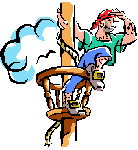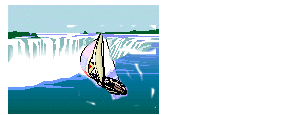
foreword | Historical Narratives | Resources | Links | Contact
THE FALLS OF NIAGARA AND ENTREPRENEURS
History is a staging of the past.
The spectacular natural wonder of the Falls has never failed to inspire awe and the entrepreneurial spirit.
 |
Over the years enterprising individuals have equated nature's magnificence with money, if only they could convince those who stop to stare to stay and spend more time and money. In order to entice tourists to tarry, various attractions have been devised over the years, the latest and largest being Casino Niagara, which is located within the call of the cataract.
 |
The first entrepreneur on this side of the river to capitalize on the cataract was a man named William Forsyth. Forsyth's chequered career began in 1796 when his Loyalist family settled on a farm in Stamford Township and William petitioned for land of his own. It was not as a property owner but as a prisoner that we next encounter "yeoman" Forsyth. He was tried as a felon in 1799 and no sooner had he been acquitted of this charge than he was jailed for a capital offence. He managed a daring escape but was quickly recaptured.
 |
One historian hinted that Forsyth's brushes with the law resulted from his detailed knowledge of the river across which he smuggled goods to and from the United States. Forsyth petitioned for release from prison, promising "to banish" himself from the colony. His banishment was only to the border, however, for when next we hear of Forsyth it is as owner of land near the Horseshoe Falls. He built an inn on the site which according to advertisements of the time had the finest possible view of the Great Thunderer.
During the War of 1812 William served with the 2nd Lincoln Militia to mixed reviews. While he was cited for harassing the Americans at Beaver Dams, he was also sharply criticized for leaving his post at night to return to his home. As a British spy he frequently had occasion to cross the river and while it was alleged by some that he
 |
gave as much information as he got, it was never proven that he was a double agent. In spite of the fact that this self-serving man of "uncouth behaviour" was not liked by his neighbours, no one ever disputed the loyalty of the man who had himself been captured by the Americans and had his home plundered
In 1818 Forsyth built a covered stairway into the gorge and charged one shilling per person for this unusual view. Because his stairs occupied part of a 66-foot wide military land allowance between his holdings and the river, Forsyth petitioned the Executive Council for a lease on the land and the right to operate a ferry below the Falls. Both requests were refused.
 |
Forsyth's combined acreage gave him a mnopoly on the best view particularly from the Table Rock outcropping near the edge of the Horseshoe Falls. In 1822 he built the Pavilion Hotel, a handsome, three-storey frame structure with piazzas on both sides. This splendid establishment was advertised as having a view "unequalled in this new country." In addition it had a larder filled with "viands from every land" and wine cellars containing the best most costly liquors and wines in the world.
Forsyth promoted the presence of tourists by providing daily stagecoaches from Buffalo, Lewiston and Queenston and when tourists arrived, he rented them post-horses. He also featured a misty tour behind the mighty Horseshoe Falls for which customers were outfitted with waxed pantaloons, frock coats, hats and shoes.
 |
Forsyth vowed to supplement the "unrivalled natural beauties of the wild and romantic scenery" with any spectacle that caught the public's fancy. He did this successfully and by 1827 he was "reaping" a fair reward from an appreciative public. In September of that year in cooperation with several other huckster hoteliers, Forsyth sponsored what was ballyhooed to be the ultimate in entertainment. A "condemned" schooner, Michigan, was filled with a captive cargo of animals and sent over the Falls. When the great day arrived thousands lined the shore to watch the unwitting cast of creatures plunge to their doom. The hapless victims included: two bears, a buffalo, two foxes, a raccoon, an eagle, a dog, and 15 geese. The bear and one goose survived the fatal fall. Forsyth had founded the first tourist trap.
Forsyth was an unwitting participant in another occurrence known to history as "the outrage at Niagara Falls." It occurred because of Forsyth's illegal occupancy of the military Land allowance. Forsyth built a fence around his own land which overlooked the Falls and the military land allowance adjoining it so that anyone wanting to see the Falls from that location would have to pay him to do so. Instead of seeking Forsyth's removal from government land by proceeding through civil court, Lieutenant-Governor Sir Peregrine Maitland simply dispatched a detail of soldiers who proceeded to tear down Forsyth's enclosure in order they said,"to prevent any monopoly."
 |
This unkindly clash provoked a public outcry. A committee of the Legislative Assembly joined the chorus on Forsyth's behalf and summoned to a hearing the officer connected with the incident. When this individual requested permission from Maitland to attend the hearing, Maitland refused. Subsequently the Sergeant-at-arms of the Assembly forcibly entered the officer's home, arrested him and confined him to the common gaol. Members of the Assembly had a long list of reasons for wanting Maitland removed and they set out to confirm by this lawless action and Maitland's other arbitrary acts that civil rights and free speech in Upper Canada were endangered by a military despot. Authorities in London agreed and Maitland was severely censured by the Colonial Secretary for substituting military might for the legal process and recalled.
William Forsyth endeavoured to monopolize tourist trade at the Falls and when he ultimately failed to accomplish this, he decided to quit the business and sold out. This man, who built and lost a tourist empire, lived out his life in elegant comfort in Bertie Hall, his fashionable, pillared home. The river never lost its lure for the Forsyth family for when William died in 1841, he left land along the Niagara to his wife and his children.
Copyright © 2013 Website Administrator